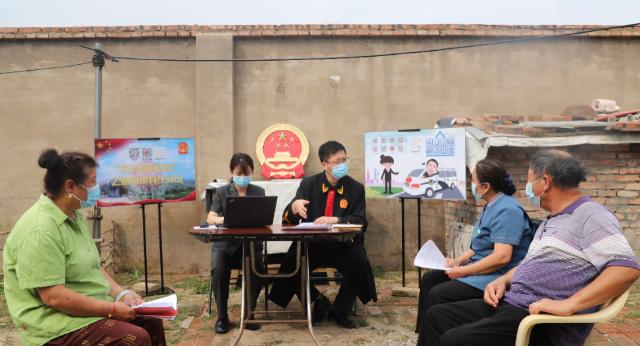Ms. Fangshan Yi in Beijing sued her neighbor in court for blocking roads and overgrown with weeds from construction waste. Recently, Wan Huibing, president of the Changyang People's Court of the Fangshan Court, came to gongchen street second street village for a circuit trial and solved this neighboring damage prevention and exemption relationship dispute case on the spot.

The plaintiff, Ms. Liu, and the defendant, Mr. Ma, were neighbors for many years. Due to a road blockage two years ago, Ms. Liu was unable to travel on a tricycle to see her paralyzed husband and took Mr. Ma to court.
Ms. Liu complained that two years ago, the defendant, Mr. Ma, had built a wall outside the house, causing a lot of construction waste to be added to the road for no reason, and taking up two-thirds of the road more than two meters wide. His wife is paralyzed in bed, and he often needs to drive a tricycle to take his wife to the hospital, and now the road is blocked, causing the car to be unable to travel. After the mediation of the neighborhood committee was ineffective, he could only sue to the court to demand that Mr. Ma restore his original state.
The defendant, Mr. Ma, argued that the construction waste was left over from the demolition and was not piled up by himself. Due to the heavy rain this year, construction waste is covered with weeds, blocking the road.
After accepting the case, the judge immediately carried out an on-site investigation and learned from the public about Ms. Liu's family conditions, travel difficulties and other practical difficulties.
In order to actually solve the problem of people's travel, the judge went to the scene to carry out the circuit trial. At the trial, according to Ms. Liu's evidence, it could not be shown that Mr. Ma was piling up construction waste. On the basis of the facts of the case and in combination with the relevant laws and regulations of the Civil Code, the judge explained to the parties on the spot that the handling of adjacent relationships should uphold the principles of solidarity and mutual assistance, mutual understanding and mutual accommodation, and friendly consultation. Mr. Ma immediately said that he could clear the road together, and Ms. Liu filed a complaint in court.
After the trial, the judge extended the trial function, cleaned the road with the staff of the neighborhood committee and neighbors, and gave Ms. Liu a barrier-free road.